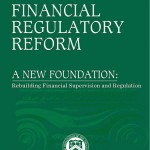
The news these days is largely about the financial reform bill on the floor of the Senate. I think you know my opinion about that: many good things, not enough to solve the root problems, but still better than nothing.
Here’s a simplified way of thinking about things. There are two general problems with the financial sector today, which were the subject of two consecutive columns by Paul Krugman. The first problem, according to Krugman: “Much of the financial industry has become a racket — a game in which a handful of people are lavishly paid to mislead and exploit consumers and investors.” This is what we see in the SEC-Goldman suit, the Magnetar trade, and so on. The financial reform bill is largely (but not exclusively) aimed at this problem; that’s why there are a consumer protection agency, new trading and clearing requirements for derivatives, etc. These reforms, I think, have a reasonable chance of doing good.
The second problem, again in Krugman’s words:
“The reforms currently on the table . . . only deal with part of the problem: they would make finance safer, but they might not make it smaller. . . .
“We’ve been devoting far too large a share of our wealth, far too much of the nation’s talent, to the business of devising and peddling complex financial schemes — schemes that have a tendency to blow up the economy.”
This is the long-term challenge (see my charts here). Finance is an intermediate input. At the margin, every little innovation that makes markets more liquid does provide a small benefit to the economy in the form of better capital allocation; but in many cases those benefits are not enough to justify their transaction costs, let alone the negative systemic externalities we saw recently. The flowering of finance in the past three decades gave us the illusion of growing real GDP — especially in the past decade, when GDP growth was dominated by finance and real estate. Now we need to rebalance the economy toward productive activities.
The bad news is that the administration and Democrats in Congress will face a strong temptation to pass the reform bill and declare victory. The conventional wisdom is that you don’t get re-elected by saying, “We passed a bill that is pretty good, but doesn’t solve the root problems, so we need to do more in the future.” It’s better politically to say you fixed the problem once and for all, then cross your fingers and hope for the best.
The good news is that there seems to be a growing number of voices saying that we need structural change in the financial sector. Besides Krugman and Arianna Huffington, Martin Wolf has chimed in as well, arguing that making the current system safer, though necessary, is insufficient:
“The financial system would remain a doomsday machine. There are three difficulties. First, there is no sound basis for deciding how much capital is enough. Second, . . . it is profitable to take risks whose upside accrues to oneself and whose downside accrues to others. So the safer regulators try to make the system, the more risk it can take on. Finally, it is easy to create the desired risk via regulatory arbitrage.”
Serious academic economics is also questioning the value of a large financial system. A paper by Nicola Gennaioli, Andrei Shleifer, and Robert Vishny (cited by Krugman here) shows how excessive production of securities (the phenomenon of the past decade) can be caused by mistakes in risk perception, making the financial system more fragile as a result. (As a another result, the social benefits of innovation can be outweighed by the social costs.)
So in the long term, I agree with Krugman: “These [current] reforms should be only the first step. We also need to cut finance down to size.” Given that whatever comes out of Congress will be imperfect in anyone’s eyes, whether the Obama administration agrees will be of crucial importance.
By James Kwak at the Baselinescenario
ATTENTION READERS
We See The World From All Sides and Want YOU To Be Fully InformedIn fact, intentional disinformation is a disgraceful scourge in media today. So to assuage any possible errant incorrect information posted herein, we strongly encourage you to seek corroboration from other non-VT sources before forming an educated opinion.
About VT - Policies & Disclosures - Comment Policy



